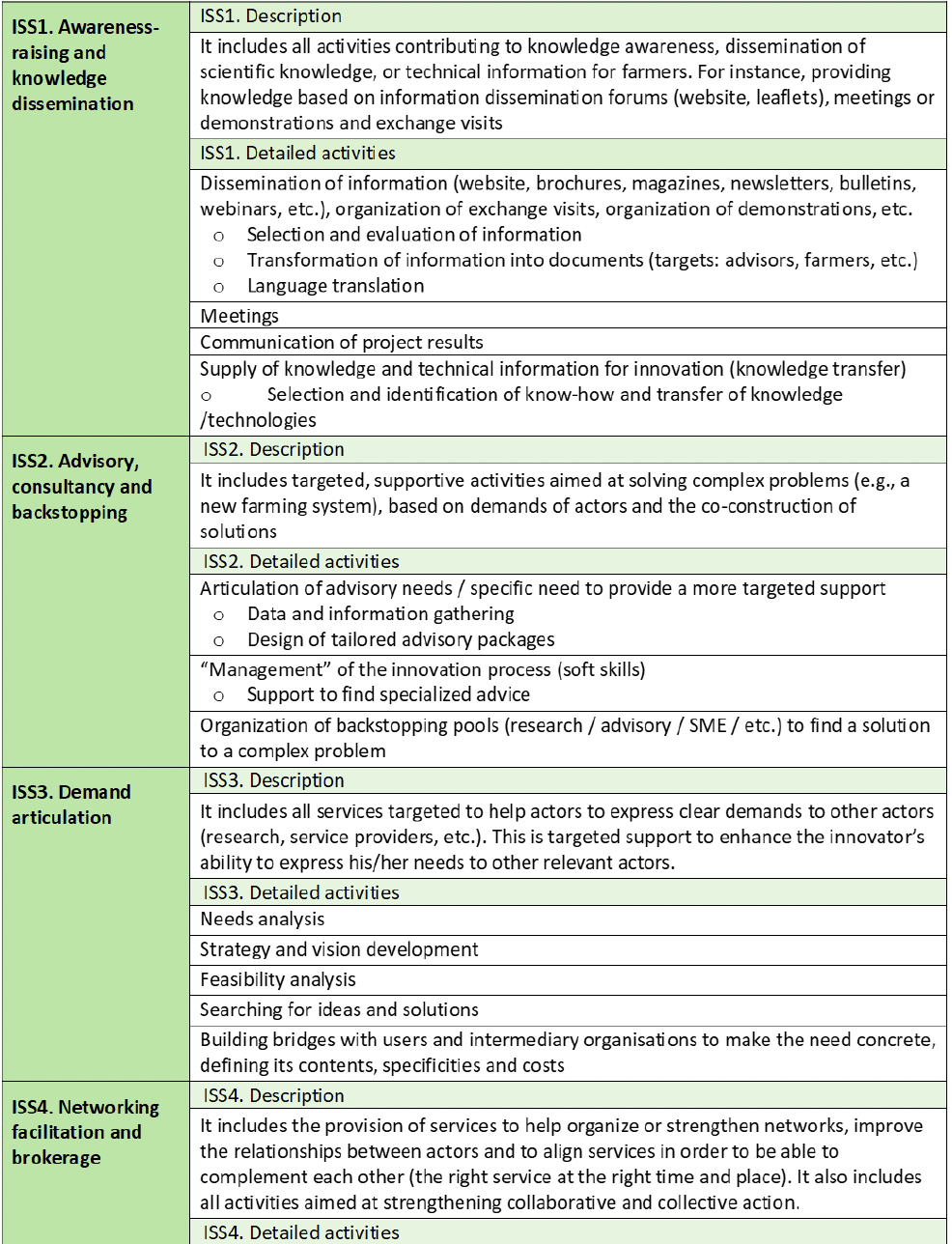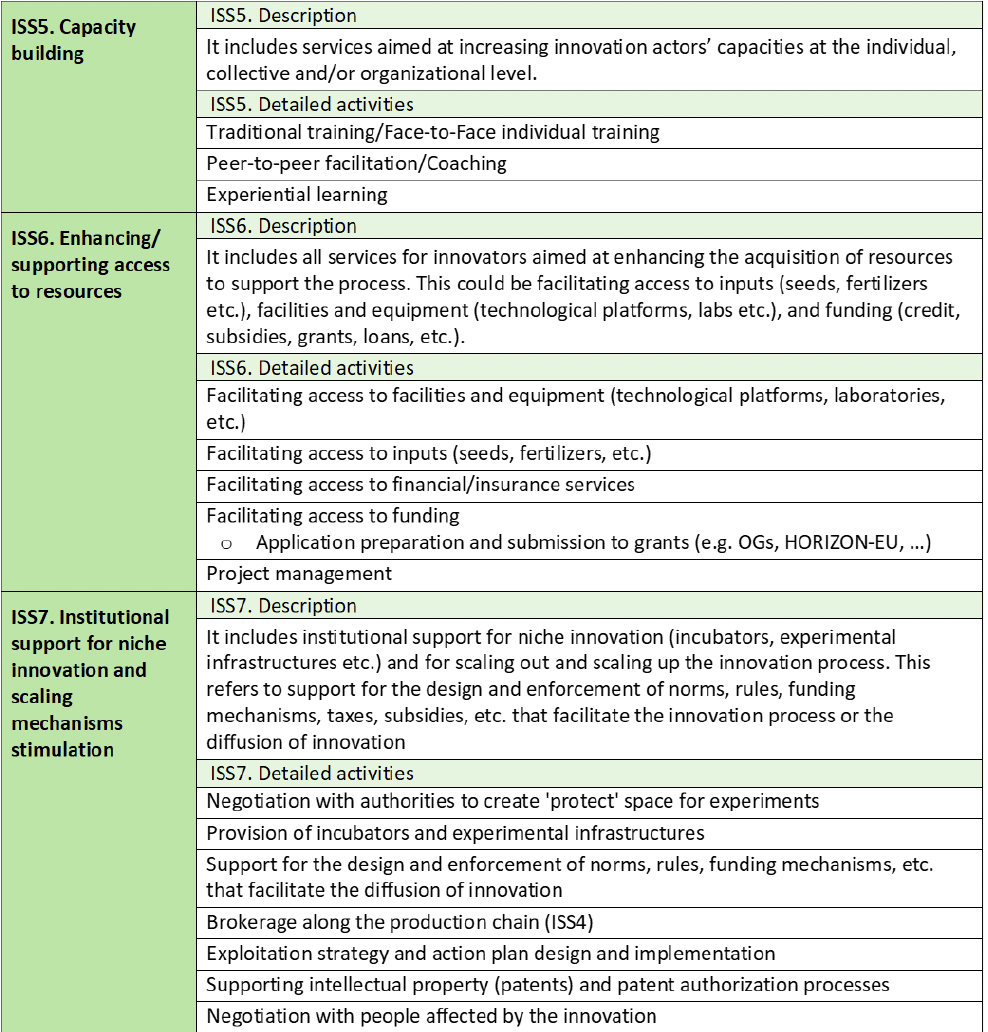
Go back
The CAP Regulation (EU) 2021/2115 requires EU Member States (MS) to provide support for innovation, in particular for the preparation and implementation of the EIP-Agri operational groups (OGs) whilst capturing and making use of grassroots innovative ideas ((art. 15 (4) (e) and recital 50). The expected result is a general improvement of connections between actors, policies and programmes/projects, knowledge(s) and experience(s), methods and instruments to speed
up the creation of innovative solutions.
Innovation support services (ISS) represent a novelty from a policy perspective and, therefore, require governance models, approaches, competences and tools that foster their effective implementation and embedding in the respective national/regional AKIS.
The term ‘innovation support services’ came into the mainstream a few years ago and it is new in the CAP framework. To date, there is no shared understanding on ISS, neither in-depth analysis concerning the actors providing the services, their linkages with other actors and the support they provide to innovation processes. Furthermore, there is little awareness of the skills and competencies needed to improve services delivery.
Following recital 50, delivering innovation support services means to turn an innovative idea into a good innovation project plan by capturing individual grassroots innovative ideas, refining them, connecting relevant partners with useful expertise for the objective of the project, preparing a project proposal on which expectations of different actors converge (finding win-win), drafting a cooperation agreement and a final project proposal.
Indeed, this interpretation is rather narrow, compared to what is widely described by the literature, where ISS are referred to as “services that make innovation happen by fostering interactions and constructing knowledge”. These include a wide range of activities aimed at creating the conditions for identifying and discussing solutions, opportunities and new ideas by combining perspectives, knowledge, experience and resources.
According to several European projects, ISS can be summed up into 7 functions (or services) and related activities, that are all important to enable an innovative process to move forward, starting from the birth of an idea to the design of an innovation project, its realisation and, finally, the dissemination and the embeddedness of the realized innovation in a wider environment.
Table 1: Innovation support functions and activities


Source: ATTRACTISS project
In practice, these services are carried out by a variety of providers who can be both public or private and can act with a specific mandate or just because they are interested in pushing the innovation process forward. However, hardly a single service provider is responsible for driving the whole innovation process, but different actors can coordinate with each other’s contributing, by performing different functions, to achieve successful outcomes. This is because the services which are needed for driving a whole innovation process evolve along the process itself and might require different competences to be involved in a particular phase.
Currently, ISSs providers differ considerably across EU Member States depending on whether advisory systems are public/privatised, integrated/fragmented, centralised/decentralized.
Due to the novelty of the intervention, it is therefore interesting to see how the different Member States are arranging to meet the regulatory requirement.
The practice presented in this "Compendium" showcases some interesting and replicable approaches: the first directly relates to the implementation of ISS in the Veneto Region, the second one illustrates a method of providing a service. In Italy, the Veneto Region is going to support innovation in agricultural, forestry and agrifood sectors through multiactor partnerships called "Innovation Hubs", that will be financed through EAFRD founds. Their primary objectives
include the identification of grassroot innovative ideas, provision of training, information and knowledge sharing and dissemination, promoting the adoption and sharing of innovations, connecting actors within the Agricultural Knowledge and Innovation System (AKIS). Innovation Hubs can be supported jointly through the interventions "Provision of advisory services" and "Demonstration actions for the agricultural, forestry, and rural sectors".
The Bus trip is an innovative approach that can be used to achieve a variety of goals: enhance interaction and collaboration among partners within EIP-AGRI Operational Groups (OGs) or other multi-actor projects, facilitate experiential learning and knowledge sharing, inspire new ideas.
In this perspective, we could raise a few questions (not exhaustive) to help us reflect on how to better direct AKIS interventions towards the effective organization of innovation support services: